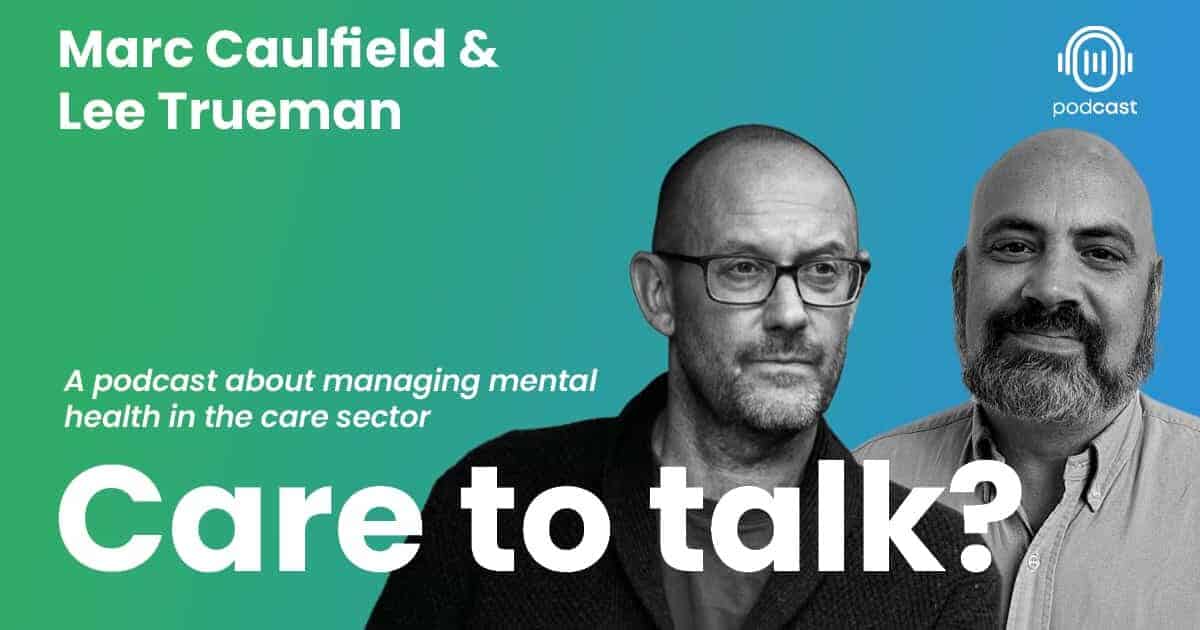
Guest blog: Managing stress in the care sector
By Marc Caulfield and Lee Trueman, Care to talk? podcast hosts and wellbeing advocates
When we began curating topics for ‘Care to talk?’ podcast, stress was very high up on the list.
Why? Because vocational jobs like care work are very prone to stress. These careers are all about purpose, passion and making a difference. When your working life is centred around these three tenets, being able to walk away at the end of the working day becomes very difficult. And that leaves people working in care open to consistent and high levels of pressure and stress.
The science of stress
Stress is a natural human physiological reaction; it ignites the ‘fight or flight’ response in our bodies allowing us to fight our way out of, or run away from, danger. This response was designed to allow us to escape an attack from a sabre-toothed tiger. But it wasn’t designed to be a constant presence in our normal day-to-day lives.
Prolonged stress like this causes an imbalance in the body’s chemistry that has deep psychological and physiological effects. Unless stress is managed, it can, and probably will, develop, becoming anxiety and potentially depression. We covered the science behind stress in episode 2 of Care to talk? – you can listen here to find out more.
Action needs to be taken by the time pressure – a normal feeling that we all need in order to be productive – becomes stress. However, the likelihood is that someone who is driven by purpose, passion and a desire to make a difference will ignore the early warning signs that consistent stress is having an effect on their mind, body and performance.
This is where managers in care need to be super involved – and vigilant to the stress levels within their teams.
Steps to managing stress
As managers there are four main areas to focus on: spotting change, talking, listening and acting.
Firstly, it’s important to learn how to spot the signs of difficulty in your team and/or in yourself. It’s not necessary to understand mental health conditions in detail and you certainly do not want to diagnose – this can be a side effect of too much knowledge. But you do need to be able to spot warning signs that might indicate there’s an issue.
The main thing to look for here is change. Changes in behaviour, attitude or appearance can all be signs of difficulty. For example, you might have someone in your team who has become much more irritable lately, or is quieter than they used to be. They might have started turning up late or stopped washing their hair or changing their clothes. Or perhaps they’re knocking three or four extra drinks back at the after work social. Also try to ‘look in the mirror’. Ask yourself, have you been doing things differently lately? It’s important that you look after yourself – in other words, put on your own oxygen mask first.
Next is learning to talk. Learning to talk in an open way is not always easy when you are busy. You must ensure you take the time and space to have a conversation. Saying, “I am worried you are depressed” to a team member, will not work the same way as, “I have noticed you are not yourself lately, is everything OK?”. Sensitivity and compassion are key, so give yourself the time to not rush. You also need to be prepared for a colleague coming to you, so do not start a conversation you do not have time for.
Listening is by far the hardest part and quite frankly something most of us are not very good at. I always say to remember we have two ears and one mouth, so listen at least twice as much as you speak. It is also very important to listen non-judgementally. Your opinion on someone else’s mental health is not important. Hearing what they are saying is.
The final area is to act. What should you do now you realise that you or someone you know is struggling? You must remember you are not a therapist; your role is supporting that person, giving them some time off, providing additional resource, having a tricky conversation with a senior manager or client etc. Signposting someone to their GP and/or counselling and therapy services is really where your responsibility should stop. Legal action can be the unfortunate outcome of a clumsy handling of a delicate situation. Sensitivity and training are the name of game here.
Taking care of each other
Prevention is always preferable to cure, and there is an onus on care organisations to look after their team’s mental health and wellbeing. Care organisations must ensure they have legally robust policies, procedures and training in place to ensure all staff can recognise issues in themselves, and all managers should be trained in spotting the signs in others, as well as themselves. Furthermore, the Equality Act 2010 makes it crystal clear that mental health must be treated the same as physical health.
As a simple first step, ask yourself these questions:
- Do I actually know my people? What makes them tick and what is their personal life is like?
- Do I know about the people they are caring for?
- Would I recognise them struggling?
If the answer to any of these questions is no, then there is some work to do. Let’s all look out for each other, especially during these incredibly tricky times and continue the hugely important work that the care industry does day in day out.